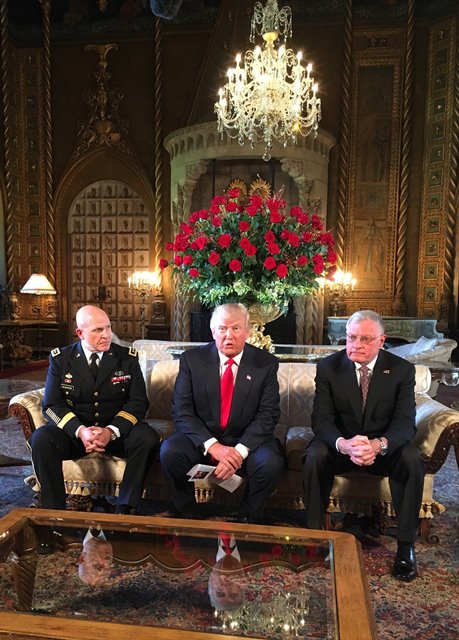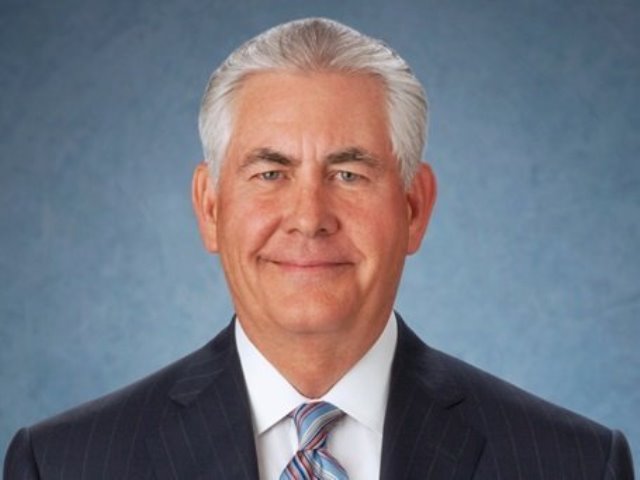President Donald Trump’s pick for national security adviser, Lt. Gen. H.R. McMaster, hasn’t shied away from expressing strong public opinions on military and strategic issues.
That makes the celebrated military strategist and thinker unusual in the ranks of the Army, which decorated him for his multiple combat tours in Iraq and Afghanistan. It also makes for fodder on the policy perspectives he’s likely to bring to 1600 Pennsylvania Avenue, ones that could well go against the grain.
In his 1997 book on Vietnam, “Dereliction of Duty,” he emphasized the need for military officers to provide their unvarnished professional advice on matters of war. And he has has never shied away from adhering to his own advice.
In addition to frequently quoting the ancient Greek historian Thucydides, McMaster has taken a hard line on Russia, called for robust engagement in in the fights in Iraq and Afghanistan and expressed skepticism that advantages in technology can make war quicker and cheaper. Here are some of his lines of thought on controversial subjects.
Russia
McMaster has struck a much tougher tone when talking about Russian President Vladimir Putin than Trump has, particularly with regard to his actions in Ukraine. McMaster has said the Kremlin carried out a “land grab.”
He also told the Senate Armed Services Committee in 2015 that it was “plausible” Russian troops might carry out a similar type action in the Arctic.
And McMaster alleged that Moscow has engaged in a variety of tactics, including “propaganda, disinformation and political subversion” aimed at fracturing the West — tactics the US intelligence community later said Russia exhibited during the 2016 US presidential election.
These actions were meant “to collapse the post-World War II –certainly the post-Cold War — security and economic order in Europe and replace that order with something that is more sympathetic to Russian interests,” McMaster told a group at the Center for Strategic and International Studies in Washington in 2015.
McMaster also told the Virginia Military Institute in November that Russia, along with China, North Korea and Iran, represented “hostile revisionist powers” that need to be confronted.
In order to confront Russia, McMaster, who was tasked by the Army with reviewing the Kremlin’s use of “hybrid warfare” in Ukraine, has called for a more robust military presence to be deployed to Russia’s borders to “ratchet up the costs” of future aggression.
Afghanistan and Iraq
McMaster received the Silver Star for his actions during the Gulf War, but it was his command of US troops in 2005 in Tal Afar, Iraq, that helped shape his views on modern conflicts and his belief that winning war requires forces on the ground that can change the political calculus.
He received accolades for his success in pacifying the city at the apex of violence in Iraq, pioneering some of the counterinsurgency tactics that formed the backbone of the 2007 strategy used by Gen. David Petraeus.
The general is quick to argue against the notion that new technologies, such as drones, or tactics like Special Forces raids can be a substitute for land forces and engagement with local populations, two main characteristics of counterinsurgency.
“Wars like those in Afghanistan and Iraq cannot be waged remotely,” he wrote in a 2013 editorial in The New York Times titled “the Pipe Dream of an Easy War.”
McMaster has been highly critical of Presidents George W. Bush and Barack Obama, saying they were too reliant on technology, risk averse and constrained by political considerations in war — including a desire to get out as fast as possible before victory was achieved.
He has also been critical of an over-reliance on commando raids, drone strikes and proxy forces, which Obama employed in the fight against ISIS.
“Raids, because they are operations of short duration, limited purpose and planned withdrawal, are often unable to effect the human and political drivers of armed conflict,” he wrote in an essay for the Defense Entrepreneurs Forum in 2014, adding that “reliance on proxies” was also “problematic due to issues involving capability as well as willingness to act consistent with US interests.”
Fighting ISIS
McMaster has assessed that ISIS is on the way out, but he’s said that the effort has gone too slow because the US hasn’t committed sufficient ground troops.
A “shift has occurred towards there toward eventual defeat,” he said at the Virginia Military Institute, but calculated that air power alone was inadequate.
“The approach that we took proved to be insufficient,” he said. “What was missing was a land force.”
The Pentagon is currently considering whether to recommend deploying a conventional ground unit to Syria to aid the fight there.
He is also a user of strong language when it comes to identifying the threat groups like the Taliban and Isis pose.
“I believe that we are engaged in sort of righteous causes right now and I think it’s OK for us to want to win against these misogynist murderous bastards that we are fighting in the greater Middle East,” he told The Ledger-Enquirer newspaper in 2014.
“If you listen to them, just as if we were to listen to the Nazi Party in Germany in the late 1930s, they tell us what they’re going to do if they’re able to gain power,” he added. “The enemies we’re seeing in the greater Middle East and in Afghanistan are enemies of all civilized people.”
Dissent
McMaster earned renown for his book critiquing the government’s handling of Vietnam, criticizing Presidents John F. Kennedy and Lyndon Johnson on down. He has been known for his bluntness and willingness to make waves, all of which suggests he won’t be a shrinking violet when it comes to giving his perspective to the commander in chief.
“The disaster in Vietnam was not the result of impersonal factors but a uniquely human failure, the responsibility for which was shared by President (Lyndon) Johnson and his principal military and civilian advisers,” he wrote in “Dereliction of Duty,” a best-seller that became required reading for many military officers.
He rapped Johnson and Kennedy for reorganizing the National Security Council, particularly taking the latter president to task for relying instead on political advisers with whom he had close personal relationships.
Asked about his own tendency to buck convention and speak out, McMaster told The Ledger-Enquirer: “Some people think, ‘Hey, you’re in the military and everything is super-hierarchical and you’re in an environment that is intolerable of criticism and people don’t want frank assessments.’ I think the opposite is the case.”
He concluded, “The commanders that I’ve worked for, they want frank assessments, they want criticism and feedback.”




